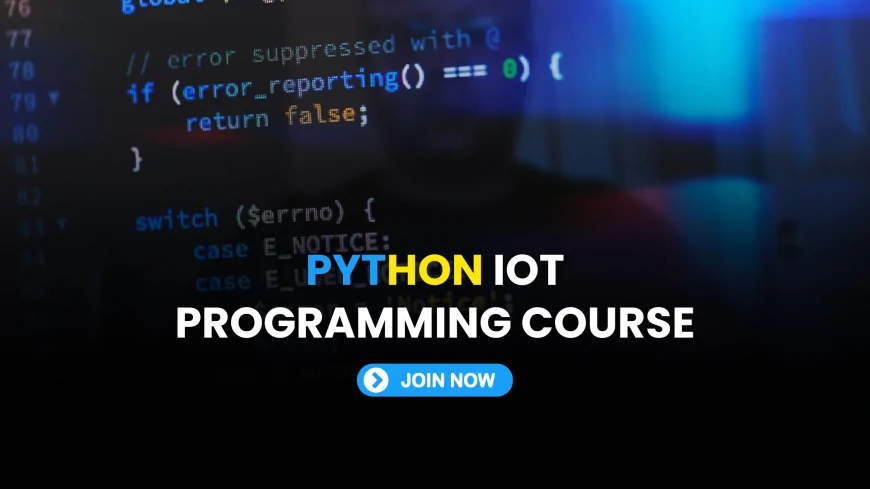Python IoT Programming Course: Best Training in Pune | Python for Embedded and IoT Applications – Pune Courses
Enroll in the best Python IoT programming courses in Pune and master real-world skills with Raspberry Pi, sensors, and automation projects. Learn from top institutes with hands-on training, certification, and career support in IoT development using Python.

Table of Contents
- Introduction
- Why Python for IoT?
- Importance of IoT Programming Training
- Who Should Enroll?
- Key Modules Covered in Python IoT Courses
- Top Python IoT Training Centers in Pune
- Project-Based Learning in IoT
- Certification and Career Support
- Cost Comparison of IoT Courses in Pune
- Online vs. Offline IoT Python Training
- FAQs
- Conclusion
Introduction
In an era dominated by smart devices and automation, Python-based IoT (Internet of Things) programming has become one of the most in-demand skills in Pune’s growing tech ecosystem. This article highlights the top Python IoT programming courses in Pune that combine theoretical learning with hands-on project execution to help you build smart applications.
Pune is known for its strong IT infrastructure, advanced tech institutes, and growing startup ecosystem—making it an ideal place to start your journey into Python IoT development.
Why Python for IoT?
Python has emerged as the go-to language for IoT (Internet of Things) development due to its adaptability, ease of use, and powerful ecosystem that supports both software and hardware integration. Here's a deeper look at why Python is the ideal choice for IoT applications:
Simple Syntax, Faster Prototyping
Python's clear and concise syntax makes it incredibly easy for developers—even beginners—to prototype IoT applications rapidly. Developers working with sensors and microcontrollers benefit from rapid prototyping capabilities to test and refine their code swiftly. Python minimizes boilerplate code, helping you test, debug, and deploy much faster than other languages like C or Java.
Seamless Integration with Hardware
Python supports a wide range of microcontrollers and single-board computers, especially Raspberry Pi, one of the most popular platforms in the IoT world. Through libraries like RPi.GPIO and Adafruit_Blinka, Python can easily control GPIO pins, interface with sensors, and perform real-time tasks.
Vast Collection of IoT-Compatible Libraries
Python offers an extensive ecosystem of libraries tailor-made for IoT, including:
-
pySerialfor serial communication -
paho-mqttfor messaging via MQTT protocol -
smbusfor I2C device communication -
OpenCVfor computer vision in smart surveillance -
Flask/FastAPIfor building lightweight IoT dashboards and APIs
This makes it easier to handle everything from device communication to cloud data exchange.
Platform Independence
Python runs smoothly on cross-platform environments—Linux, Windows, and embedded operating systems like Raspbian. This flexibility means developers can write code on a PC and deploy it seamlessly on an IoT device like Raspberry Pi or BeagleBone Black.
Cloud and Data Analytics Integration
IoT generates massive volumes of data. Python is not only excellent for device-level programming but also excels in data processing and analytics through libraries like Pandas, NumPy, and SciPy. Moreover, integration with cloud platforms like AWS IoT, Google Cloud, and Microsoft Azure is straightforward with Python SDKs.
Strong Community and Educational Support
The Python community is vast and global, with a strong focus on education and open-source collaboration. There are hundreds of tutorials, forums, and GitHub repositories where developers share Python-based IoT solutions. This helps learners and professionals troubleshoot faster and stay updated with evolving trends.
Supports Both Edge and Cloud Development
Python is not restricted to running on the cloud. It’s also effective on edge devices, allowing developers to create smart systems that process data locally—crucial for latency-sensitive applications like real-time alerts or automation.
Scalability for Industrial IoT Applications
From home automation to industrial-level IoT systems, Python scales efficiently. Whether you're building a small smart garden or a large-scale industrial sensor network, Python can grow with your application.
MicroPython and CircuitPython
"With MicroPython and CircuitPython, Python has been adapted to function efficiently on microcontrollers such as the ESP8266 and ESP32, enabling developers to deploy Python code on compact, resource-constrained IoT hardware."
Education-First Language Encouraging Innovation
Python is often the first language taught in schools and engineering colleges. This ease of access promotes early experimentation with IoT and inspires students and hobbyists to innovate in fields like healthcare, agriculture, and smart cities.
Importance of IoT Programming Training
Learning IoT programming isn’t just about writing code—it’s about interfacing with sensors, understanding real-time data communication, and building devices that can think and act. A Python IoT training course helps you:
-
Understand embedded systems, microcontrollers, and cloud integration.
-
Connect and control physical devices.
-
Apply coding to real-world smart solutions like smart homes, wearables, and industrial IoT.
Who Should Enroll?
This course is ideal for:
-
Engineering students (ECE, CSE, IT, Electrical)
-
Working professionals seeking upskilling in embedded systems and automation.
-
Startup founders and product developers
-
Freelancers & tinkerers wanting to build smart IoT products
-
Researchers & innovators in smart agriculture, manufacturing, or healthcare
Key Modules Covered in Python IoT Courses
Python IoT courses in Pune typically include:
-
Python Fundamentals – Variables, data types, loops, conditionals, functions
-
Interfacing with Raspberry Pi & Arduino
-
Sensor Integration – Temperature, light, humidity, gas, PIR, ultrasonic sensors
-
Data Acquisition & Storage – Local + Cloud (Firebase, MQTT, REST APIs)
-
GPIO Programming
-
Networking & Protocols – HTTP, MQTT, Bluetooth, Wi-Fi, Zigbee
-
Automation Projects – Home automation, smart lighting, IoT dashboards
-
Final Capstone Project
Top Python IoT Training Centers in Pune
1. WebAsha Technologies, Pune
-
Specialized IoT & Embedded Systems programs
-
Real-world Raspberry Pi & sensor projects
-
Flexible weekend & evening batches
Project-Based Learning in IoT
Real-world project execution is at the heart of any quality IoT course. You’ll work on:
-
Smart Home Automation System
-
IoT-Based Weather Station
-
Health Monitoring Device
-
RFID Door Lock System
-
Smart Agriculture Monitoring
-
Motion Detection Security System
These projects demonstrate your ability to code, wire, test, and troubleshoot real embedded systems.
Certification and Career Support
Most reputable institutes provide:
-
Course completion certificate
-
Guidance for global certifications (like Cisco IoT, Microsoft Azure IoT)
-
Resume preparation + interview training
-
Internship opportunities in IoT firms
Cost Comparison of IoT Courses in Pune
| Institute | Duration | Course Fee (Approx.) | Mode |
|---|---|---|---|
| WebAsha | 6–8 Weeks | ₹12,000 – ₹18,000 | Online/Offline |
| Technogeeks | 2 Months | ₹15,000 | Hybrid |
| SevenMentor | 2.5 Months | ₹18,500 | Classroom |
| Codekul | 2 Months | ₹14,000 – ₹20,000 | Offline |
| IITians Embedded Solutions | 3 Months | ₹16,000 | Offline |
Offline IoT Python Training
| Feature | Online Training | Offline Training |
|---|---|---|
| Flexibility | Learn anytime from home | Fixed schedule |
| Lab Access | Virtual simulation, limited physical setup | Full hardware access |
| Interaction | Zoom/Google Meet sessions | Direct face-to-face interaction |
| Cost | Slightly lower | May include lab, materials, and certification |
FAQs
1. What is Python IoT programming?
It involves using Python to control hardware devices, sensors, and actuators to build smart, connected systems.
2. Do I need hardware to learn Python IoT?
While it's recommended, many institutes offer simulators or remote access to Raspberry Pi devices.
3. Can a beginner learn IoT with Python?
Yes. Courses are designed for complete beginners with foundational Python included in the syllabus.
4. What hardware is commonly used?
Raspberry Pi, Arduino, NodeMCU, sensors (DHT11, IR, Ultrasonic), LEDs, relays, and motors.
5. Are IoT courses available online in Pune?
Yes, several institutes offer both online live and recorded formats with lab support.
6. Is Python enough for IoT?
Python covers a large portion of IoT tasks. However, knowledge of C/C++ can enhance your skills for embedded platforms.
7. What projects will I build?
Home automation, sensor data loggers, RFID security systems, weather monitors, etc.
8. Do these courses offer certification?
Yes, all major training providers offer certificates upon successful course completion.
9. How long does it take to learn?
Typically 6 to 10 weeks with regular practice and project work.
10. Are weekend batches available?
Yes, most institutes offer weekend classes for working professionals and students.
11. Will I learn to use Raspberry Pi?
Yes, Raspberry Pi is a core part of many Python IoT programs in Pune.
12. Can this lead to a job?
Yes. You can apply for roles like Embedded Developer, IoT Engineer, or Python Developer in IoT domains.
13. What are the career options after training?
IoT Developer, Automation Engineer, Python Programmer, Embedded Systems Engineer, Freelance Tech Maker.
14. What is the average course fee?
Course fees range from ₹12,000 to ₹25,000 depending on the institute and course depth.
15. Are there placement services?
Yes, many institutes offer placement support and internship assistance.
16. What is MQTT in IoT?
MQTT is a lightweight messaging protocol commonly used in IoT for real-time data exchange.
17. Can school students join?
Yes, if they have a basic understanding of computers and interest in technology.
18. What software will I use?
Thonny, Python IDLE, PyCharm, MQTT Broker, Adafruit IO, and Node-RED.
19. Is IoT programming difficult?
Not with proper guidance. Python makes hardware programming more accessible and beginner-friendly.
20. Will I get hands-on practice?
Yes, practical exposure through sensors, GPIOs, and complete real-time projects is included in most courses.
Conclusion
Python IoT training in Pune bridges the gap between programming and physical computing, giving learners the power to create intelligent, connected devices. Whether you’re aiming to build the next smart home gadget or break into embedded systems, these courses offer practical, hands-on experience backed by industry-recognized certifications and strong career support.
Pune, with its rapidly expanding tech ecosystem and affordable yet advanced training institutes, is undoubtedly one of the best cities to learn Python IoT in India.
What's Your Reaction?
 Like
0
Like
0
 Dislike
0
Dislike
0
 Love
0
Love
0
 Funny
0
Funny
0
 Angry
0
Angry
0
 Sad
0
Sad
0
 Wow
0
Wow
0















